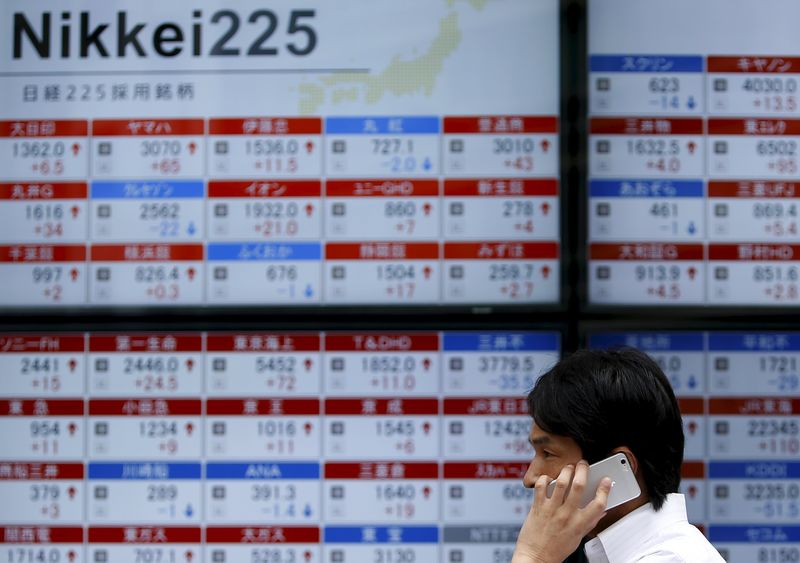By Hideyuki Sano
TOKYO (Reuters) - Concerns about slowing growth in China sent Asian shares to two-year lows and pressured oil prices on Thursday while minutes from the U.S. Federal Reserve's July meeting dented expectations for a rate hike in mid-September.
MSCI's broadest index of Asia-Pacific shares outside Japan shed 1.1 percent, with Hong Kong's Hang Seng Index falling as much as 2.0 percent at one point to an 8-month low. Japan's Nikkei fell 0.7 percent.
European shares are expected to open almost flat after the pan-European stock index touched a six-week low on Wednesday.
Fears that growth in China, which carried the global economy following the 2008 international financial crisis, is slowing over the long term are affecting risk assets around the world.
China's combined exports and imports for the first seven months of 2015 fell 7.2 percent from the same period last year, prompting Beijing to devalue the yuan last week.
While a cheaper yuan should help boost China's exports, a deadly blast last week near Tianjin port, an important trade hub, looks set to disrupt any recovery in trade in the near term.
"When a currency is devalued around five percent, normally you can expect a pickup in exports. But then in China's case today, there was a blast in Tianjin, which is likely to dent the picture of a rebound in exports in July-Sept," said Toru Nishihama, senior economist at Dai-ichi Life Research Institute.
"I would expect an export recovery only by the end of year," he added.
The commodities sector was among the hardest-hit by fear of slowdown in Chinese demand.
U.S. crude oil prices eased 0.5 percent after a fall of more than 4 percent on Wednesday following an unexpectedly large increase in U.S. stockpiles, barely holding above its 6 1/2-year low of $40.40 per barrel.
It last stood at $40.61, with a break below $40 seen as likely to trigger a fresh wave of selling.
Brent crude futures fell 0.6 percent to $46.89, edging near the six-year low of $45.19 touched in January.
Falls in oil and other commodity prices hit many resource-exporting emerging economies hard, and they have already suffered shocks from capital outflows as the prospect of higher U.S. interest rates looms larger.
MSCI's emerging market index set a new four-year low, having fallen 22 percent from this year's high hit in April and coming within a stone's throw of its Oct 2011 trough.
"Markets are nervous of risks and investors are pulling funds out of emerging economies and resource exporters," said Daisuke Uno, chief strategist at Sumitomo Mitsui Bank.
Many emerging market currencies are also under pressure, with their economic woes compounded by local political problems in some cases.
In one such example, the Turkish lira
Minutes from last month's Fed monetary policy meeting showed officials in broad agreement that the U.S. economy was nearing the point where interest rates should move higher.
But they also noted lagging inflation and a weak global economy posed too big a risk to commit to "lift off", leading some investors to question the likelihood of a rate hike in September.
U.S. Treasury yields fell and money market futures rolled back expectations of a rate rise in September.
The 10-year U.S. Treasuries yielded 2.122 percent, having declined from an eight-month high of 2.500 percent touched in June.
The dollar also lost its edge against other major currencies. It fell to a three-week low of 123.68 yen on Wednesday and last stood at 123.95 yen while the euro also rose to $1.1132, extending its rebound from this week's low of $1.10165 touched on Tuesday.
Gold also gained, rising to a one-month high of $1,140.80 per ounce.

"Following the July FOMC minutes, we retain our call for September lift-off. However, we see the bar for the rate hike as having been pushed a bit higher. The higher bar, combined with lower energy prices and a modest deterioration in the international outlook since the July FOMC, has raised risks over this call," Rob Martin, economist at Barclays (LONDON:BARC) said in a report.